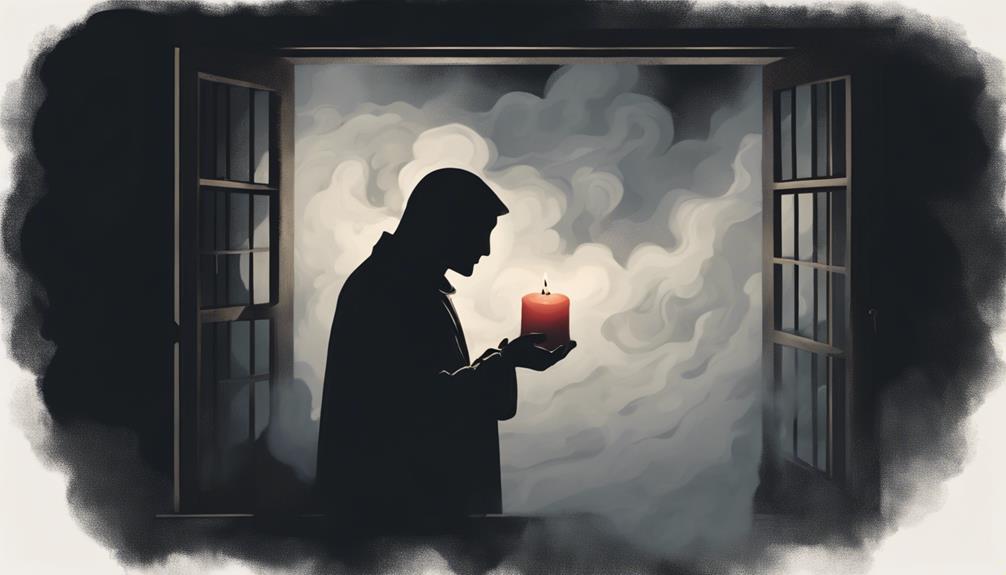Hidden relationships can cause emotional turmoil because they thrive on secrecy, which breeds anxiety and isolation. You might feel a constant conflict between your desire for intimacy and the need to conceal it, leading to internal struggles. The fear of discovery heightens vulnerability, fueling a cycle of stress. Guilt and shame often amplify feelings of responsibility, while trust issues create uncertainty, complicating your emotional landscape. This secrecy may even result in long-term consequences like chronic anxiety and strained future relationships. Understanding these dynamics is essential for you to regain emotional stability and foster healthier connections.
The Nature of Hidden Relationships

Hidden relationships often thrive in the shadows, where secrecy breeds both intimacy and anxiety. You might find yourself drawn to someone outside the conventional parameters dictated by societal norms, which can create a unique bond. However, this closeness often comes at a cost, as hidden relationships challenge your personal boundaries. You may wrestle with the tension between the thrill of secrecy and the fear of exposure.
In maneuvering these hidden dynamics, you're likely to confront conflicting emotions. On one hand, the intimacy that secrecy fosters can feel exhilarating. On the other, the anxiety stemming from societal expectations can be overwhelming. You might feel a constant need to protect your relationship from judgment, which can strain your mental well-being.
Additionally, the very nature of hidden relationships often complicates communication. You may find it difficult to express your feelings openly, not just to your partner but also to yourself. This lack of transparency can lead to misunderstandings and emotional turmoil.
Ultimately, while hidden relationships can provide a sense of connection, they also force you to grapple with the inherent complexities of secrecy, intimacy, and the boundaries you're willing to maneuver.
Psychological Impact of Secrecy
Secrecy in relationships can profoundly affect your mental health, often leading to feelings of isolation and internal conflict. When you hide a significant part of your life, you might experience emotional conflict, torn between your desire to connect with others and the need to keep secrets. This ongoing tension can create a sense of disconnection from friends and family, leaving you feeling unsupported and alone.
Cognitive dissonance plays an essential role in this dynamic. You may find yourself grappling with conflicting thoughts and emotions about your hidden relationship. On one hand, you might feel excitement and passion; on the other, guilt and anxiety about the deception involved. This inconsistency can lead to stress, making it challenging to focus on other aspects of your life, such as work or personal goals.
Moreover, the mental strain of maintaining secrecy can drain your emotional resources. You might develop a heightened sense of vigilance, constantly worrying about what might happen if your secret comes to light. Ultimately, the psychological impact of secrecy can manifest as anxiety, depression, and a pervasive sense of unease, complicating your emotional landscape even further.
Fear of Discovery

The constant anxiety surrounding the possibility of your secret being uncovered can heighten feelings of fear and vulnerability, amplifying the emotional turmoil already present in your life. You may find yourself constantly scanning your environment for potential threats, worrying about what might happen if someone discovers your hidden relationship. This fear can lead to a cycle of stress, negatively impacting your mental well-being and making it difficult to enjoy the moments you do share with your partner.
Effective fear management is essential in maneuvering through these turbulent emotions. Establishing clear relationship boundaries can help create a sense of safety, allowing you to articulate what's acceptable and what's not within your secretive dynamic. By having these boundaries in place, you can reduce the unpredictability of your situation, which often fuels anxiety.
Moreover, acknowledging and addressing your fears directly can empower you to take control of your emotional landscape. Instead of allowing fear to dictate your actions, you can choose to confront the potential consequences of discovery, enabling you to make informed decisions about your relationship. This proactive approach not only alleviates some of the anxiety but also fosters emotional resilience in the face of uncertainty.
Guilt and Shame Dynamics
Steering through the complex emotions of guilt and shame can leave you feeling trapped, as these feelings often intertwine and exacerbate each other within the context of a hidden relationship.
Guilt triggers may arise from your actions or decisions, leading you to question your choices. You might find yourself thinking about the consequences your relationship has on others, amplifying your sense of responsibility. This guilt can initiate a cycle where you feel compelled to hide further, creating a façade that deepens your emotional burden.
As guilt festers, it can spiral into shame, a more profound and internalized emotion. Shame spirals can lead you to believe you're fundamentally flawed for being in a hidden relationship, further isolating you from support systems. You may start to internalize negative narratives about yourself, which can diminish your self-esteem and sense of worth.
This dynamic often becomes a vicious cycle, where guilt feeds into shame, and shame intensifies your guilt, leaving you feeling powerless and overwhelmed. Understanding these emotions is the first step toward breaking free from this turmoil and reclaiming your emotional well-being.
Trust Issues and Insecurity

Steering through trust issues and insecurity often feels like walking a tightrope, where the fear of betrayal and doubt about your partner's feelings can lead to constant emotional unrest. Hidden relationships exacerbate these feelings, as the lack of transparency creates a fertile ground for misunderstandings.
When you're uncertain about your partner's commitment, you may find yourself second-guessing every interaction, leading to a communication breakdown that further fuels your insecurities.
Emotional vulnerability becomes a double-edged sword. On one hand, you want to express your fears and concerns; on the other, you worry that doing so might push your partner away. This hesitance to be open can create a cycle of distrust, where you both avoid discussing your feelings, leading to greater emotional turmoil.
To navigate this tightrope, it's essential to foster open communication. Addressing your fears with your partner can help bridge the gap created by insecurity and build a foundation of trust.
While it's challenging, being vulnerable can pave the way for greater intimacy and understanding, ultimately alleviating the emotional unrest that comes with hidden relationships.
Emotional Isolation and Loneliness
Emotional isolation often creeps in when hidden relationships thrive, leaving individuals feeling detached and disconnected from their partners. You might find yourself grappling with emotional disconnection as the secrecy surrounding your relationship creates barriers to genuine intimacy. This lack of openness can lead to feelings of loneliness, as you may feel unable to share your experiences or emotions with friends and family.
As you navigate this emotional turmoil, social withdrawal may become a coping mechanism. You might distance yourself from social interactions, fearing judgment or misunderstanding from others. This withdrawal can further exacerbate feelings of isolation, leaving you trapped in a cycle of loneliness. You may yearn for connection but feel unable to reach out, as the hidden nature of your relationship weighs heavily on your emotional well-being.
Recognizing these patterns is essential. Understanding that emotional isolation is a natural response to the challenges of secretive relationships can help you identify the need for open communication and support. By acknowledging your feelings, you can take steps to break free from this isolation, fostering healthier connections that promote emotional fulfillment.
Long-term Consequences of Secrecy

Secrecy in relationships can lead to profound long-term consequences, often eroding trust and creating emotional scars that linger long after the hidden dynamics are revealed. When you engage in a secretive relationship, the initial thrill may mask underlying issues, but over time, these issues can disrupt your emotional resilience. You might find yourself questioning your self-worth or feeling isolated from friends and family who are unaware of your situation.
The relationship dynamics can shift dramatically once the secret is exposed. You may experience feelings of betrayal, anger, or disappointment, not just toward your partner but also toward yourself for allowing the secrecy to persist. This emotional turmoil can result in a cycle of mistrust that affects future relationships, making it difficult to fully open up again.
Moreover, the psychological impact of keeping secrets can lead to anxiety and stress, further complicating your emotional landscape. It's vital to recognize that while some relationships may start in secrecy, the long-term consequences can ripple through your life, shaping your interactions and emotional well-being for years to come.
Understanding these dynamics can empower you to make healthier choices in love and connection.
Conclusion
In hidden relationships, emotional turmoil often stems from the weight of secrecy and the fear of discovery.
You may grapple with guilt and shame, leading to trust issues and insecurity, which can isolate you from others.
This isolation deepens feelings of loneliness, making it harder to find support.
Ultimately, the long-term consequences of maintaining such secrecy can erode your emotional well-being, underscoring the importance of honesty and transparency in fostering healthier connections.
